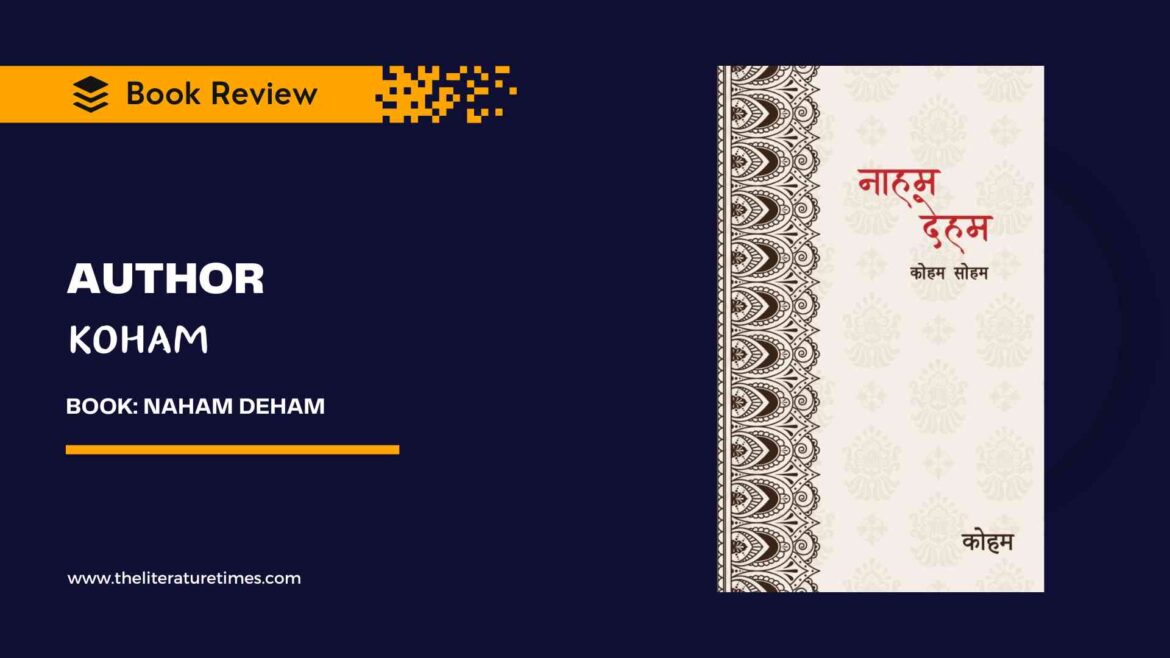“Naham Deham” by Koham stands as a testament to the enduring power of poetry to probe the depths of human consciousness. The collection seamlessly weaves the threads of existential inquiry, spiritual contemplation, and emotional expression. While the title draws inspiration from the Upanishads, the poems themselves are not bound by the constraints of religious dogma. Instead, they serve as a universal exploration of the human experience, inviting readers to embark on an introspective journey.
“Naham Deham” is woven with threads of astute observations on existence, delving into the very fabric of life itself. The poet invites readers to ponder the transient nature of human existence, reflecting on the fleeting moments that define our journey. Through the lens of his verses, Koham captures the ephemeral beauty of life, urging readers to embrace each moment with heightened awareness. The poems become mirrors that reflect the impermanence of life, encouraging readers to confront their own mortality and find meaning in the midst of transience.
As the collection unfolds, the exploration of love becomes a central motif. Koham’s verses navigate the intricacies of love in its myriad forms — romantic, familial, and platonic. The poet’s language is both evocative and tender, capturing the nuances of human connection. In these poems, love becomes a force that binds and a source of profound vulnerability. The poet explores the joys and sorrows woven into the fabric of love, painting a nuanced portrait of the emotional landscape that defines human relationships.
Loss, another universal facet of the human experience, is approached with sensitivity and depth in “Naham Deham.” The poems resonate with the ache of separation, the void left by departed loved ones, and the echoes of grief. Through poignant verses, Koham invites readers to confront the inevitability of loss, acknowledging that it is an integral part of the human condition. The poet’s ability to articulate the complexities of mourning and the enduring impact of those who are no longer physically present adds a layer of emotional resonance to the collection.
The pursuit of truth emerges as a recurring theme, interwoven with philosophical contemplations on the nature of reality. Koham’s verses invite readers to question their perceptions, peel away the layers of illusion, and seek a deeper understanding of their own existence. The collection becomes a philosophical journey, urging readers to engage in a quest for truth that transcends the boundaries of conventional wisdom. The poet’s introspective musings prompt readers to embark on their own philosophical explorations, challenging preconceived notions and inviting a reexamination of fundamental beliefs.
The poet’s choice of metaphor and symbolism contributes to the richness of “Naham Deham.” Each poem becomes a tapestry of images and symbols that evoke emotions, thoughts, and reflections. Koham employs nature, the seasons, celestial bodies, and everyday experiences as metaphors that resonate with the human experience. The careful selection of symbols adds layers of meaning to the verses, inviting readers to interpret and engage with the poetry on a symbolic level.
The linguistic craftsmanship displayed in “Naham Deham” is notable. Koham’s language is both eloquent and accessible, allowing the poetry to transcend linguistic barriers. The verses, often rhythmic and lyrical, create a melodic cadence that enhances the overall aesthetic experience. The poet’s ability to convey profound thoughts with clarity and beauty is a testament to his mastery of language, making “Naham Deham” a collection that resonates with readers across diverse backgrounds.
Beyond the philosophical and emotional dimensions, “Naham Deham” also explores the self. The poet’s introspective gaze turns inward, examining the layers of identity, ego, and self-awareness. The collection becomes a mirror that reflects the complexities of the human psyche, encouraging readers to confront their own internal landscapes. “Naham Deham” also serves as an invitation to mindfulness. The poet’s call to be present in the moment, to savor the richness of life, and to engage with the world around us aligns with the principles of mindfulness and spiritual awareness. The collection becomes a meditative journey, prompting readers to cultivate a heightened sense of awareness and appreciate the interconnectedness of all things.
In the realm of Hindi poetry, “Naham Deham” stands out as a work that seamlessly blends tradition with contemporary sensibilities. While drawing inspiration from the spiritual heritage of the Upanishads, the collection embraces a modern poetic language that speaks to the complexities of the present. Koham’s ability to bridge the gap between the ancient and the contemporary adds a layer of relevance to “Naham Deham,” making it a work that resonates with a diverse audience.
As the collection draws to a close, the reader is left with a sense of introspection and contemplation. “Naham Deham,” in its entirety, is more than a collection of poems; it is an immersive experience that transcends the boundaries of language and culture. Koham, through his verses, has crafted a poetic symphony that resonates with the human soul, inviting readers to embark on a journey of self-discovery, reflection, and connection with the profound mysteries of existence. “Naham Deham” is a literary gem that leaves an indelible mark on the heart and mind, a testament to the enduring power of poetry to illuminate the depths of the human experience.
Title: Naham Deham
Author Name: Koham
Publisher: Bluerose Publishers
Amazon Link: https://www.amazon.in/Naaham-Deham-Koham/dp/9358194081/



